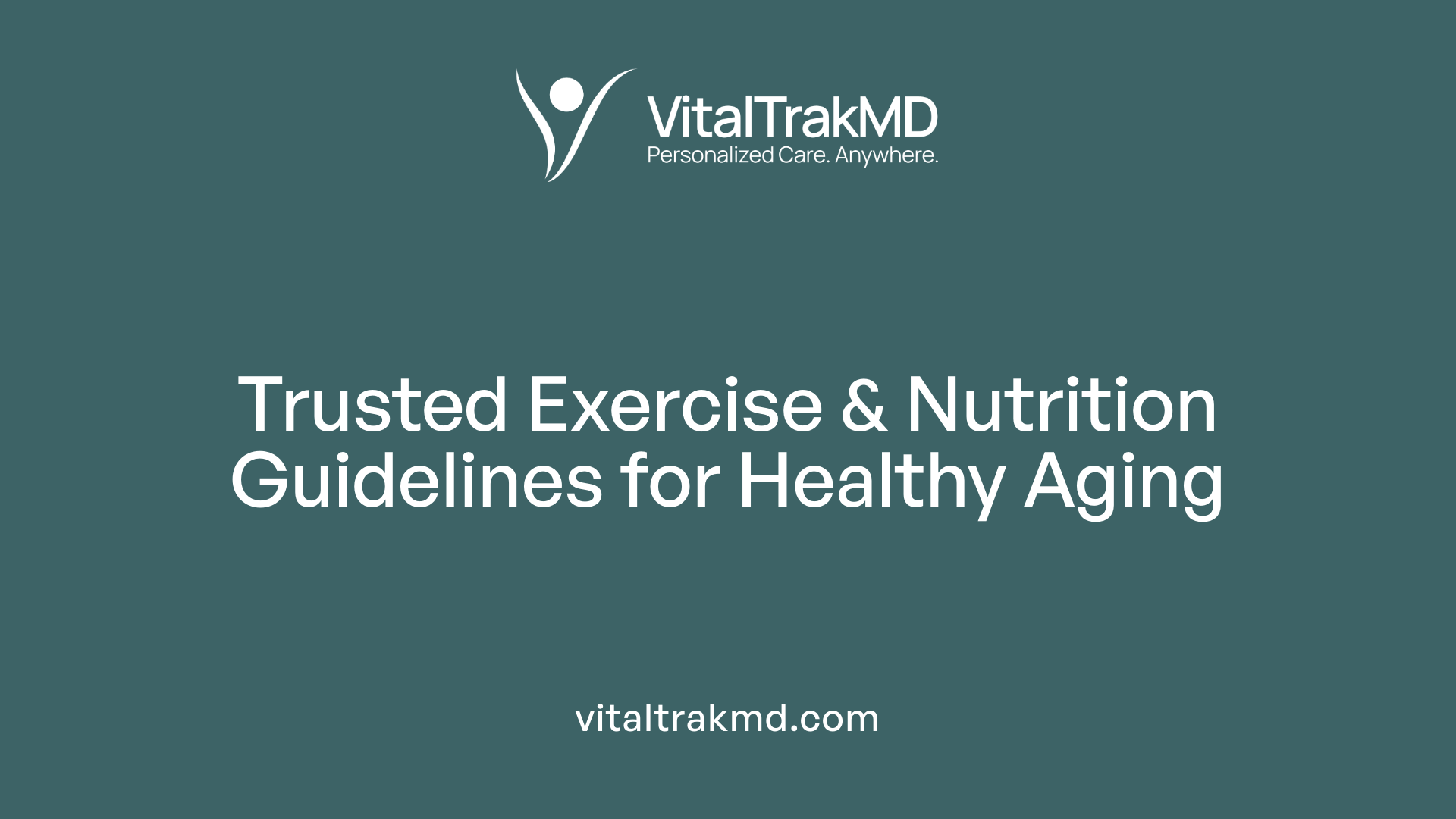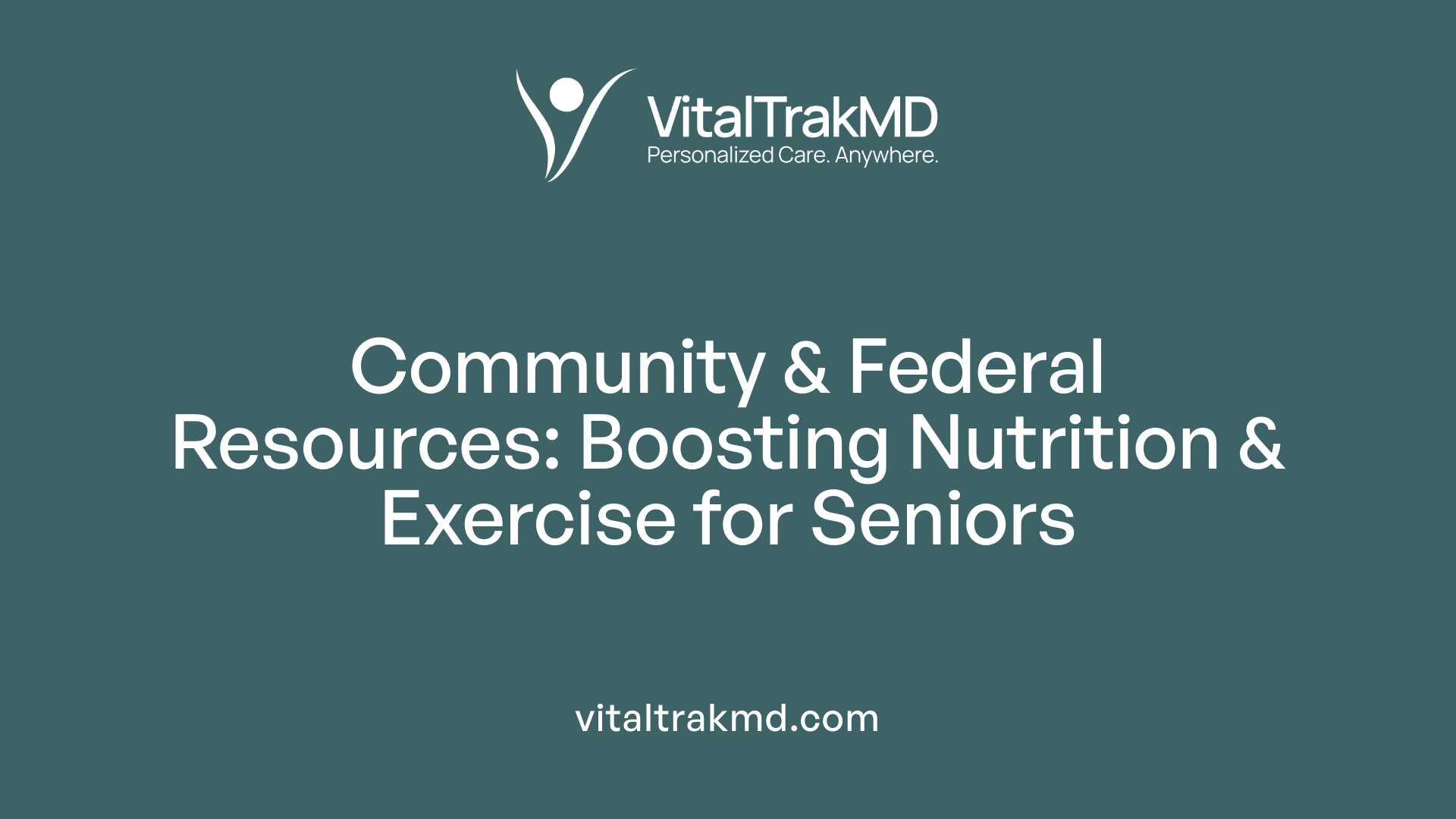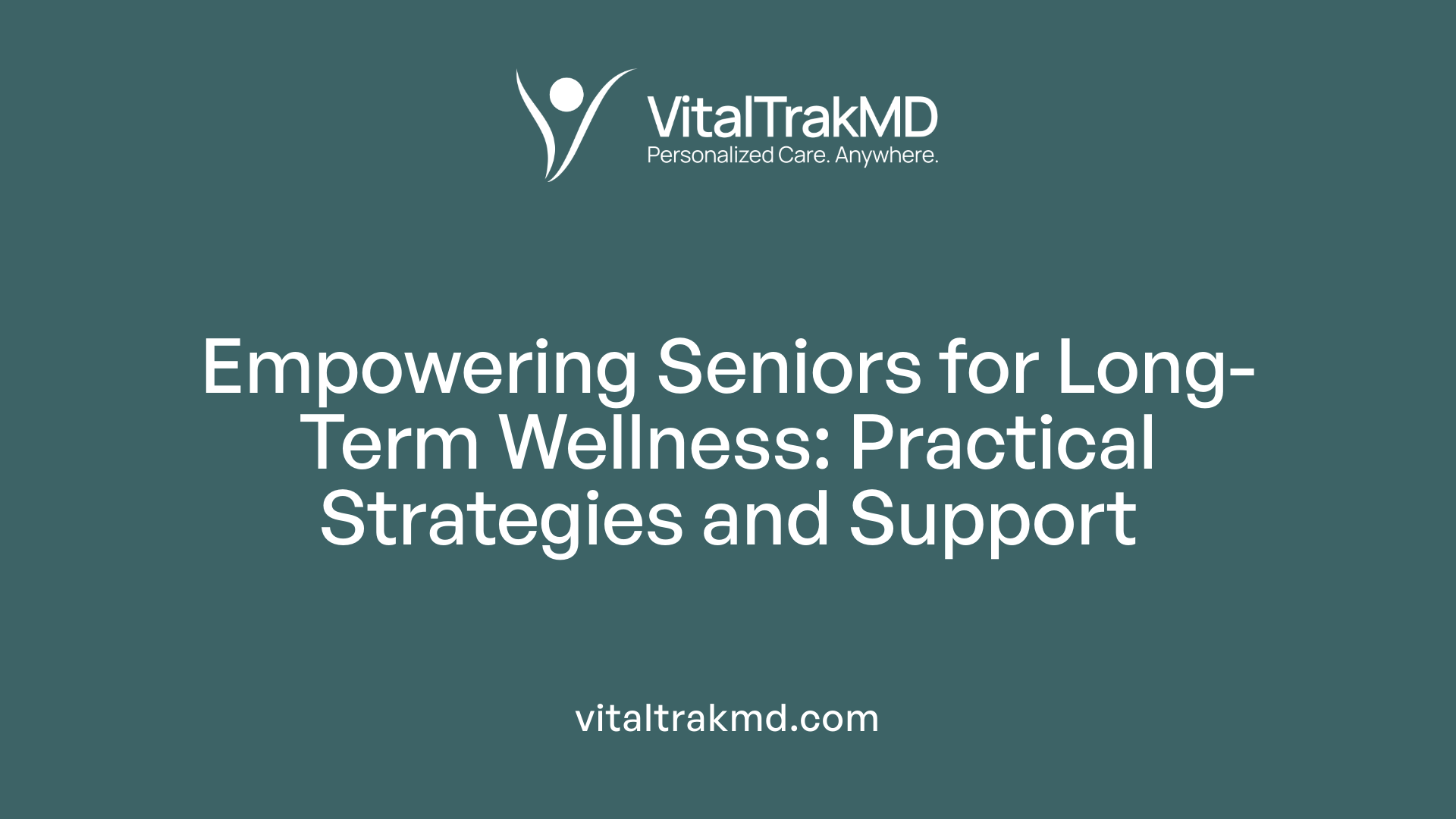Supporting Seniors With Ongoing Nutrition and Exercise Guidance

The Importance of Comprehensive Support for Senior Wellness
As the population ages, sustaining health, independence, and quality of life becomes increasingly essential. Proper nutrition combined with regular physical activity plays a critical role in healthy aging, reducing risks associated with chronic diseases, and managing weight. However, achieving these goals requires coordinated, evidence-based approaches tailored to the unique needs of seniors. This article explores effective nutrition and exercise strategies, innovative care programs, and community-based resources designed to support older adults in maintaining wellness and managing weight sustainably.
Evidence-Based Exercise and Nutrition Guidelines for Older Adults

What are the essential exercise recommendations for older adults?
Older adults are encouraged to engage in at least 150 to 300 minutes of moderate-intensity aerobic activity each week. Activities such as walking, swimming, or cycling help improve cardiovascular health and stamina while being gentle on joints. Strength training exercises targeting all major muscle groups should be performed at least twice a week, using weights or resistance bands to preserve muscle mass.
In addition, multicomponent programs that improve endurance, strength, balance, and flexibility — including yoga, tai chi, and balance exercises — are important to prevent falls and maintain mobility. Incorporating balance and flexibility routines enhances physical stability, which is crucial for independence in aging populations.
What nutritional guidelines support healthy aging in seniors?
A nutrient-dense diet is vital for healthy aging, emphasizing whole foods like fruits, vegetables, whole grains, and lean protein sources. Adequate protein intake helps counteract sarcopenia, the age-related loss of muscle mass. Vitamin B12 is essential for neurological function, while hydration is critical to avoid dehydration, a common risk in seniors.
Limiting processed foods that are high in added sugars, saturated fats, and sodium helps mitigate risks of high blood pressure, diabetes, and heart disease. Supplements such as vitamin D, calcium, and omega-3 fatty acids may be beneficial when advised by healthcare providers, supporting bone and cardiovascular health.
Hydration and supplementation considerations
Older adults are at increased risk of dehydration and should prioritize drinking plenty of water daily. Hydration supports digestion, circulation, and temperature regulation, all important for maintaining wellness.
Supplementation needs vary individually but often include vitamin D and calcium for bone health and omega-3 fatty acids for heart support. Consulting with healthcare providers ensures safe and effective supplementation tailored to personal health status.
Together, these exercise and nutrition guidelines provide a comprehensive approach to maintaining health, mobility, and independence in older adults through informed physical activity and dietary choices.
Innovative and Proven Wellness Programs for Sustainable Weight Loss in Seniors

What are the most effective wellness programs for sustainable weight loss?
Effective wellness programs for seniors blend personalized nutrition and exercise plans that consider each individual's health status and lifestyle. Programs that include balanced, reduced-calorie diets tailored to nutritional needs, combined with physical activity such as strength training and aerobic exercises, help maintain muscle mass while promoting fat loss.
Behavior change and lifestyle modifications play a critical role. Techniques like motivational support, regular progress monitoring, and realistic goal-setting (e.g., losing 5-10% of body weight within six months) enhance program adherence and sustainable results.
Features of effective weight management programs
- Personalized diets: Nutrition counseling that accounts for age-related needs and chronic conditions.
- Exercise classes: Incorporating strength, balance, flexibility, and aerobic activities.
- Behavioral support: Strategies to foster motivation and long-term adherence.
- Progress tracking: Monitoring diet, exercise, sleep, and stress levels.
- Comprehensive care: Coordination with healthcare providers for medication or surgery when needed.
Role of behavior change and lifestyle modifications
Long-term success depends on integrating lifestyle changes beyond diet and exercise. Building habits around mindful eating, stress management, and social engagement fosters sustainable wellness. Programs bolster these changes through education, support groups, and personalized coaching.
Examples of specialized programs from Sutter Health and others
Sutter Health offers medically supervised weight management programs with nutrition counseling, exercise classes, and personalized diets. Notable programs include:
| Program Name | Target Group | Focus |
|---|---|---|
| LifeSteps Adult Weight Management | General adult population | Long-term weight management through diet and exercise |
| New Weigh of Life | Individuals at risk for diabetes | Diabetes risk reduction via lifestyle change |
| Weigh to Go | Bariatric surgery candidates | Pre- and post-surgical weight management |
These programs use evidence-based strategies tailored to individual needs, incorporating behavior modification techniques and medical support.
Measurable outcomes for seniors in these programs
Evidence shows that 70% of participants maintain or lose weight six months after completing programs like "Eat Smart, Move More, Weigh Less." Additionally, improvements in blood pressure and blood sugar control have been documented, demonstrating the efficacy of integrated nutrition and exercise approaches for seniors.
These innovative and comprehensive wellness programs emphasize sustainability through personalized care, behavior change, and multidisciplinary support, all critical for effective weight management in older adults.
Comprehensive Care Programs Supporting Healthy Weight Maintenance

How do care programs support individuals in achieving and maintaining a healthy weight?
Care programs play a crucial role in helping individuals maintain a healthy weight through personalized, multidisciplinary approaches. These programs often begin with individualized assessments that consider a person’s nutritional needs, physical activity levels, health conditions, and lifestyle. Nutrition counseling and exercise guidance are tailored to each individual's goals and abilities, encouraging sustainable behavior changes.
The use of technology has enhanced these programs significantly. Remote patient monitoring and wearable devices allow health providers to track progress in real time and intervene as needed, improving motivation and accountability. For example, virtual weight management programs offer convenient, accessible support led by registered dietitians.
Primary care practices increasingly integrate obesity specialists, enabling patients to receive expert-driven tailored treatments without having to seek separate specialty care. Such integration, seen in programs like the Weight Navigation Program, improves access and outcomes.
In addition to lifestyle interventions, comprehensive programs can include behavioral support and medical options such as pharmacotherapy or bariatric surgery. This spectrum of care ensures treatment plans meet individual health profiles, empowering long-term success and effective weight maintenance.
Which components are essential in designing successful weight loss care programs?
Effective weight management programs combine multiple components:
- Thorough assessments: Understanding patients’ health status, body composition, and challenges.
- Personalized goal-setting: Creating realistic, achievable targets aligned with individuals’ preferences and capacities.
- Behavioral modification: Employing strategies that foster lasting healthy habits.
- Nutritional guidance: Encouraging nutrient-dense diets low in added sugars and unhealthy fats.
- Exercise counseling: Promoting at least 150 to 300 minutes of moderate physical activity per week, including strength and balance training.
- Continuous support: Providing regular counseling, follow-up, and feedback to sustain motivation and adherence.
- Technology utilization: Digital tools facilitate monitoring but work best when combined with professional support.
At the system level, education for healthcare providers, strong care coordination, leadership support, and recognizing obesity as a treatable condition amplify program success. This integrated approach is especially important for older adults, to maintain wellness, prevent complications, and enhance quality of life.
Community and Federal Resources Enhancing Senior Nutrition and Physical Activity

Role of community-based evidence-backed exercise programs
Several federally funded community programs provide older adults with access to proven physical activity interventions. Examples include Active Living Every Day, Geri-Fit, Tai Chi for Arthritis, and Bingocize, which combine exercise with health education. These programs focus on improving strength, balance, mobility, and reducing arthritis symptoms. The National Council on Aging (NCOA) connects seniors to these resources, helping to increase participation and enhance health outcomes.
Nutrition assistance initiatives targeting seniors
Various federal nutrition programs support seniors, particularly those with lower income or special needs. These include the Commodity Supplemental Food Program (CSFP), Senior Farmers' Market Nutrition Program (SFMNP), and the Supplemental Nutrition Assistance Program (SNAP). Additionally, congregate meal services and home-delivered meal programs like Meals on Wheels, often funded through the Older Americans Act (OAA), ensure access to nutritious meals. Such initiatives contribute to improved dietary intake and overall wellness.
Importance of culturally relevant and accessible health education
Efforts are made to tailor nutrition and physical activity guidance to diverse senior populations, including Native elders and caregivers. Culturally relevant materials and virtual cooking demonstrations help overcome barriers like taste preferences and food accessibility. This personalized approach enhances understanding and engagement, fostering sustainable lifestyle changes.
Social engagement and support in promoting activity and diet adherence
Group exercises, senior living community activities, and virtual programs such as "Eat Smart, Move More, Weigh Less" offer social interaction that boosts motivation and mental health. These supportive environments encourage adherence to healthy eating and physical activity plans, improving long-term wellness among older adults.
Practical Strategies and Support to Foster Long-Term Wellness in Seniors

How can seniors safely incorporate exercise into their routine, considering different health conditions and environments?
Older adults are encouraged to engage in at least 150 minutes of moderate aerobic activity weekly, complemented by muscle-strengthening exercises twice a week. Safety tips include tailoring exercise to individual capacity, being mindful of symptoms, and adjusting for environmental factors such as exercising cautiously in cold weather. Strength training, aerobic workouts like walking or swimming, and balance exercises such as tai chi are excellent choices that address endurance, strength, and fall prevention. For individuals with chronic conditions, specific programs and guidelines ensure safe participation and health benefits.
What nutritional education and meal planning support seniors in maintaining health?
Nutrition education emphasizes a nutrient-dense diet rich in protein, vitamins, and hydration while limiting added sugars, saturated fats, and sodium. Seniors benefit from practical guides like MyPlate and the Dietary Guidelines for Americans tailored for older adults. Portion control is vital to combat slowed metabolism, and supplements like vitamin D and omega-3 can support bone and heart health when advised by healthcare providers. Programs address challenges such as food access and physical limitations to help seniors make informed, balanced dietary choices.
Are there programs that integrate physical activity with health education for older adults?
Yes, evidence-based initiatives combine exercise and education to boost motivation and wellness. For example, Bingocize merges health lessons with physical activity in an engaging way. The free virtual program "Eat Smart, Move More, Weigh Less" offers a 15-week curriculum led by a registered dietitian, covering mindful eating, weight management, and incorporating healthy behaviors into daily life. Participants receive supportive materials such as workbooks and journals, with proven outcomes including sustained weight loss and improved blood pressure.
Why is social engagement important and how are programs tailored to seniors?
Social interaction through group exercises or community activities enhances mental health and motivation, which are crucial for maintaining an active lifestyle. Senior living communities provide fitness classes, nutritious meals, and healthcare support that foster social connections. Tailored approaches consider individual health status, cultural background, and support networks, utilizing interdisciplinary teams and linking to community resources. This personalization optimizes health outcomes and sustains long-term wellness for older adults.
Empowering Seniors Toward Lifelong Wellness
Sustaining health and independence in older adulthood hinges on integrating balanced nutrition and regular, adapted physical activity supported by personalized care programs and community resources. Evidence-based guidelines, innovative wellness initiatives, and coordinated care models play critical roles in achieving sustainable weight management and improving quality of life. Leveraging technology and social support structures further enhances engagement and long-term adherence. By embracing comprehensive, tailored strategies that address the unique challenges seniors face, caregivers and healthcare providers can empower older adults to thrive physically, mentally, and socially as they age.
References
Recent articles
Want to Feel Better and Live Healthier?
Join hundreds of patients taking control of their health with personalized care that fits their life – not the other way around.
Rated 4.8/5 by 32+ customers







